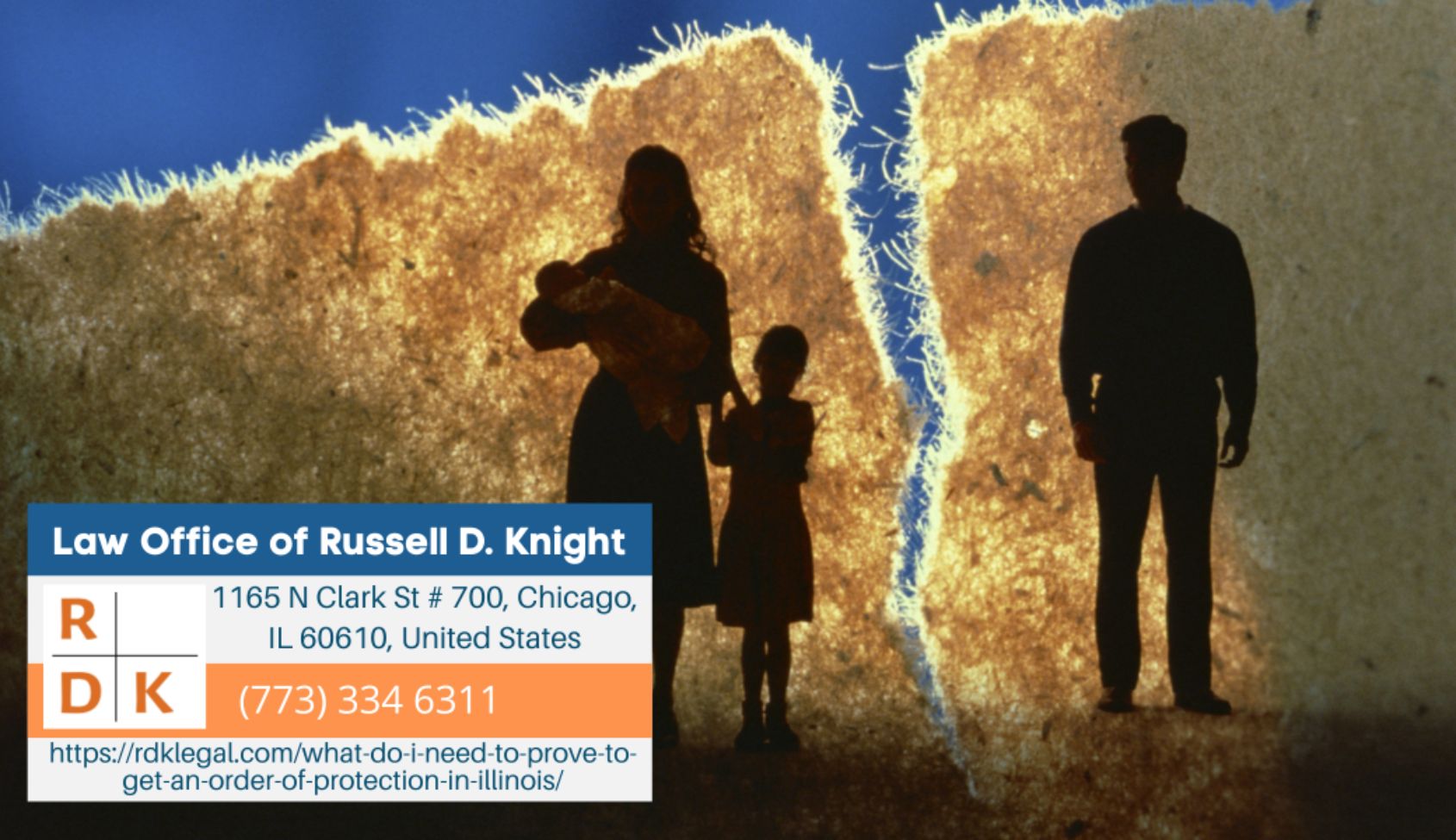Financial News
Chicago Divorce Lawyer Russell D. Knight Releases Article on Requirements for Orders of Protection in Illinois
Chicago divorce lawyer Russell D. Knight (https://rdklegal.com/what-do-i-need-to-prove-to-get-an-order-of-protection-in-illinois/) of the Law Office of Russell D. Knight has published an insightful article titled "What Do I Need To Prove To Get An Order Of Protection In Illinois?" The article discusses the intricacies of obtaining an order of protection in the state, providing valuable guidance for individuals seeking legal protection against abuse.
Chicago divorce lawyer Russell D. Knight explains that Illinois courts are proactive in granting orders of protection to prevent potential tragedies with minimal harm to the parties involved. "Orders of protection are crucial as they prevent a party from engaging in actions that could lead to future abuse," Knight states. However, he emphasizes that sufficient evidence must be presented for a court to issue such an order.
To secure an order of protection in Illinois, a petitioner must prove that they have been abused by a family or household member. Chicago divorce lawyer Russell D. Knight highlights the legal foundation for this requirement, citing the Illinois Compiled Statutes: "If the court finds that petitioner has been abused by a family or household member...an order of protection prohibiting the abuse, neglect, or exploitation shall issue" (750 ILCS 60/214).
The article outlines the various forms of abuse recognized under Illinois law, including physical abuse, harassment, intimidation of a dependent, interference with personal liberty, and willful deprivation. Each category is defined with specific criteria. For example, harassment encompasses actions such as creating disturbances at the petitioner's place of employment, repeated phone calls, and keeping the petitioner under surveillance. Knight notes that "any testimony to an incident described in the statute will suffice as evidence for harassment, thereby enabling the court to issue an order of protection."
Chicago divorce lawyer Russell D. Knight also sheds light on the broader interpretation of harassment through case law, which allows for a wider range of evidence to be considered. He explains that once a petitioner provides testimony of harassment, the respondent must rebut it by a preponderance of the evidence. Additionally, witnessing violence can qualify as intimidation of a dependent, warranting an order of protection.
The article further explores the concept of interference with personal liberty, which occurs when a respondent's actions compel the petitioner to act against their will or refrain from actions they would otherwise take. Knight clarifies that virtually any threat can meet this criterion. Similarly, willful deprivation involves denying essential needs such as food, shelter, or medicine.
Orders of protection must include written findings by the court, detailing the evidence and justifications for their issuance. Knight explains that the Illinois Domestic Violence Act requires the court to piece together proofs based on the specific incidents of abuse presented.
Addressing emergency petitions, the article outlines the process for obtaining immediate protection. Knight notes that emergency orders are typically granted without the respondent present, based on the petitioner's testimony. These orders are effective for a limited duration, usually extended every 21 days until a full hearing can be held.
During plenary hearings, both parties present full testimony and evidence. The court then weighs the preponderance of the evidence to decide whether to grant or deny the order of protection. Knight emphasizes the importance of corroborating evidence, such as telephone logs, photos of injuries, or written communications, to bolster the credibility of witnesses.
If successful, a plenary order of protection can be valid for up to two years. Additional relief, such as prohibiting firearm possession or addressing specific threats, requires further findings by the court. Knight explains that the court must consider factors like the severity and pattern of past abuse and the potential danger to the petitioner or any minor children involved.
For individuals seeking protection from abuse, this article by Russell D. Knight offers a comprehensive guide to understanding and navigating the legal requirements for obtaining an order of protection in Illinois. Readers are encouraged to consult with legal professionals to further ensure their rights are adequately protected.
About the Law Office of Russell D. Knight:
The Law Office of Russell D. Knight is a law firm in Chicago, well-versed in family law. The firm is dedicated to providing compassionate and informed legal services to individuals navigating divorce, custody disputes, and protective orders. The team at the Law Office of Russell D. Knight is committed to advocating for their clients' rights and ensuring the best possible outcomes in challenging legal situations.
Embeds:
Youtube Video: https://www.youtube.com/watch?v=UsNQF6wVNwU
GMB: https://www.google.com/maps?cid=13056420905624162796
Email and website
Email: russell@rdklegal.com
Website: https://rdklegal.com/
Media Contact
Company Name: Law Office of Russell D. Knight
Contact Person: Russell D. Knight
Email: Send Email
Phone: (773) 334-6311
Address:1165 N Clark St #700
City: Chicago
State: Illinois 60610
Country: United States
Website: https://rdklegal.com/
Stock quotes supplied by Barchart
Quotes delayed at least 20 minutes.
By accessing this page, you agree to the following
Privacy Policy and Terms and Conditions.




